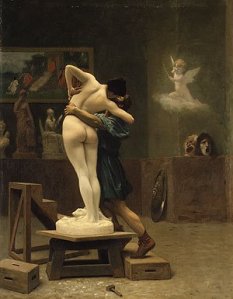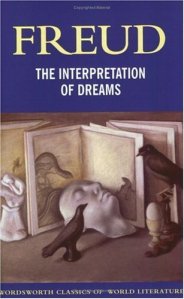Freud or Just Fun? Wish Fulfillment in Fiction.
The Query Tracker blog chain had made it back my way again. The topic this time was picked by Sandra Ulbrich Almazan:
What is the role of wish fulfillment in fiction? What personal wishes do you want your stories to fulfill? Are they the same ones you want to read about?
The first thing that came to mind when I read this topic was the story of Pygmalion and Galatea.

If you are not familiar with the story of this sculptor who fell in love with his creation, Google it. Fun stuff. Truth is, I don’t fantasize about meeting any of my characters and I’m not sure my writing is related to personal wish fulfillment.
In his book, The Interpretation of Dreams, written around the turn of the 2oth Century, Sigmund Freud proposed a theory of dream analysis. He believed analyzing dreams would open “the royal road to the understanding of unconscious mental processes.”

Am I boring you yet? Hang on, I’m not through. Stifle that yawn, you’ll have ample opportunity to use it later in this post.
Freud believed that dreams were expressions of “wish fulfillment.” Through dreams, Freud proposed, man was unconsciously attempting to resolve conflict. His theory was far more complex than I am willing to discuss (because it will take forever, I don’t remember all of it, and it will bore you to tears) and involved the preconscious censorship of information before it is relayed to the conscious mind.
Shut up with the babble and tie this post to the topic of wish fulfillment in writing, Mary.
Okay…
Perhaps books we choose to read or write function as dreams do in Freud’s theory regarding wish fulfillment. Maybe we are drawn to topics and characters that allow us to work through unresolved conflict. If that is the case, I’m troubled by some of my choices. Aren’t you?
Well, I’m not buying into the wish fulfillment theory in writing wholeheartedly. That might be a small part of it, but I think in my case, it is something else. I don’t look to literature for wish fulfillment. I write and read because it is a fun escape. Even dark, thought provoking books are fun for me. I love reading.
I had a vivid imagination as a child. I would get so lost in my make-believe world, my mother would have to shake my shoulder to pull me out of it. In looking back at my privileged, but troubled childhood, I realize my intense fantasies were escapism, not wish fulfillment.
My characters are not extensions of myself. They do not fight my inner demons. They do not accomplish my dreams.
I write because I love writing. Hammering out a rough draft of a novel is one of my favorite things in the world. I look forward to writing (not editing) in the same way I anticipate a vacation. I am going to start my new novel and rewrite an old one beginning December 16th, and you would think I was about to go on a cruise from my level of anticipation. I can’t wait.
I’m sure that it gratifies all readers to experience a story in which the characters are familiar or accomplish goals to which the reader aspires. But the topic was: How much of a part does wish fulfillment play in fiction? Much less than escapism and sheer enjoyment in my case. This isn’t true for everyone as evidenced by my fellow blog chain buddies’ posts (links in right side bar). I’m aware that there is a lot of myself in my books, so my answer isn’t absolute. We write what we know.
The amazing H.L. Dyer’s blog post preceded mine and the lovely Kate Quinn will follow.
Explore posts in the same categories: QueryTracker Chain, The Writing ProcessTags: Characters, QueryTracker Chain, Writing
You can comment below, or link to this permanent URL from your own site.
December 8, 2008 at 7:17 pm
I often wonder whether it was the cocaine speaking, or Freud…
I can relate with the over-active imagination as a child. I played Battlestar Galactica with a friend, and there were times when I would stay in character for DAYS! I was a dork, I’ll admit it, and I didn’t care who knew it.
You actually have a point about escapism. I’d say that factors for me more than wish fulfillment when I write.
Insightful post Mary!
🙂 Terri
December 8, 2008 at 7:34 pm
I wonder what that theory suggests about me since my dreams are so bizarre…
Great post, Mary!
December 8, 2008 at 11:00 pm
Interesting point about books being similar to dreams. So, where do you like to escape to? Do you think escapism and wish fulfillment are related?
December 9, 2008 at 1:53 am
Hmm… I had a dream last night that I had a horrible receding hairline from pulling my hair into a ponytail too often. That is not a wish I want fulfilled – I promise you that.
What a great new twist on this topic!
December 9, 2008 at 4:12 am
*raises hand* Reads and writes for escapism. Love the post, Mary.
LOL Kate! Great dream, that is awesome. 😀
December 9, 2008 at 5:08 pm
Awesome post Mary! It’s got me thinking too……you know, I had always kind of lumped escapism and wish fulfillment together….thought they were one and the same. But you are right, they aren’t the same. I always thought that I read and wrote for escapism too, but again, it was the same thing as wish fulfillment in my mind. But, I do things to my characters, and enjoy reading things in other books that I would never in a million years want to happen to me. So, hmmm. That certainly puts a much different perspective on things for me 😀
And I’ve got to second Heather. Freud would have a hay-day with my dreams 😀
December 10, 2008 at 12:27 am
Nice post, Mary! There are times when I am all about escapism, but I also think to some extent that escapism and wish fulfillment are related. If you want to escape something, it is a wish of yours, and if writing or reading allows you that escape…wish fulfilled.
December 11, 2008 at 6:27 am
Wish fulfillment is just one dream theory, for those who are worried about their dreams’ manifest content. (Speaking of which, the dreams rarely mean what they appear to mean — that is, the manifest content is not the same as the latent content…)
Mary, you went all psychological on me! *swoons with academic joy*
December 11, 2008 at 6:27 am
Oh, and bonus points for the Gerome painting.
*swoons again*